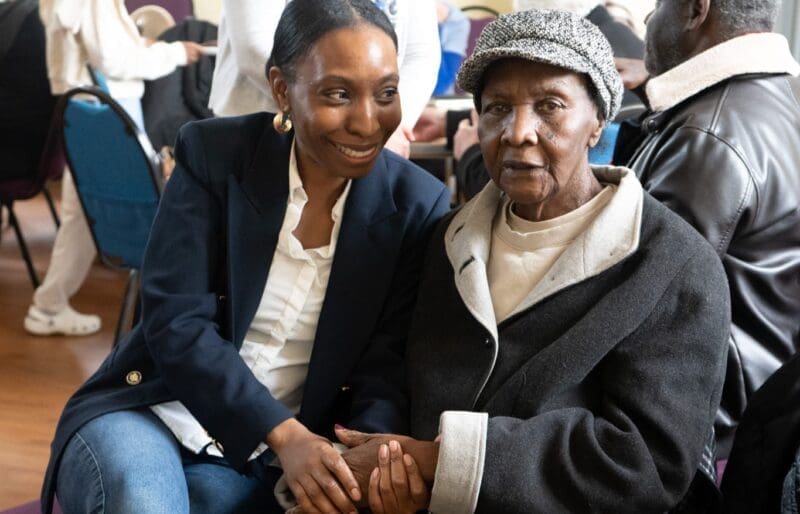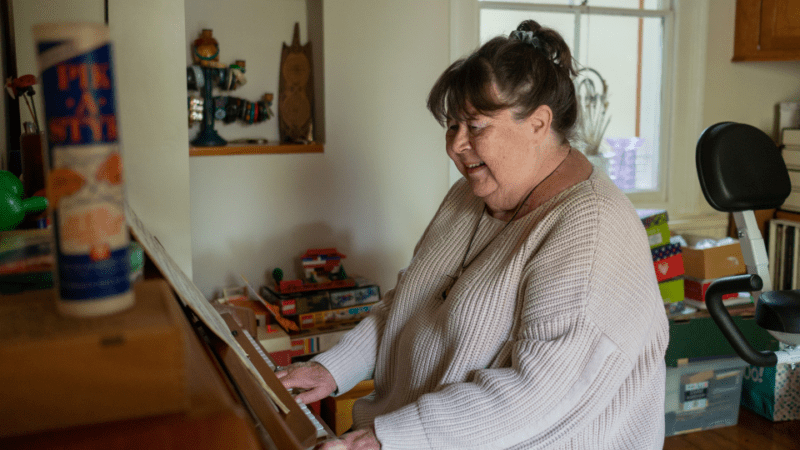
Finding community through dementia support groups and cafés
We explain what dementia support groups and cafés are and how they can benefit people affected by dementia.

Admiral Nurse Michelle, who works on our Helpline, shares the importance of looking after your mental health as a carer, and the support that’s available to you.
It is essential to consider your own mental health and wellbeing when you are caring for someone with dementia. How can you provide care if you are neglecting yourself and your own needs?
We know that this can be difficult. Some people are caring in isolation with no family or support. Others may be looking after children or grandchildren so have additional caring responsibilities. They may well be working too.
However, many people who take a regular break from caring, go on holiday, visit friends and family or book respite care return to caring with a renewed sense of hope, strength and vigour.
When you contact our Helpline, you will speak to a dementia specialist Admiral Nurse: a registered nurse who has specialist knowledge, skills and training in dementia.
We have all gained a significant amount of experience throughout our nursing careers and many have cared for their own family members. It is highly likely that the nurse you speak to will have supported someone who is feeling the same as you are feeling right now.
We appreciate that many carers are ‘learning on their feet’ and have lots of concerns about whether they are doing or saying the right things to their loved ones. Admiral Nurses can give you advice to help you in your caring role – and most importantly, reassure you that you are doing the best you can.
Find out about your rights and entitlements – and use them! As an unpaid carer, you are entitled to a carer’s assessment, which is an assessment of your needs to see how your caring role impacts on your life and what support you might need to make it easier. For example, you might be able to access support groups, get help with housework and gardening, or be offered respite care for the person with dementia.
Let your doctor and employer know you are a carer. If you are an employee, you have certain rights, such as the right to request flexible working, take carer’s leave and take time off in an emergency. Your employer may also be able to offer additional flexibility and personal adjustments to help you in your caring role.
You or the person with dementia may also be eligible for financial benefits, and it is worth seeing if there are any supporting services or a carers’ hub in your area – speaking to others in a similar situation can be a great help when you are feeling stressed and distressed.
There are many reasons people call our Helpline when they are feeling distressed. For example, people often call when they are overwhelmed by sudden changes in the behaviour or personality of the person they care for, or because they have struggled with a lack of support since the person’s diagnosis.
Many people call for advice, but often they just want to talk. They are relieved to be able to share what they are feeling and thankful for being listened to. As Helpline nurses, we actively listen – and that can be just what the caller needs.
Find out more about how our Admiral Nurses can support you with your mental health, or any other aspect of dementia.

We explain what dementia support groups and cafés are and how they can benefit people affected by dementia.

Marianne Jones is a journalist and podcaster, and an ambassador for Dementia UK. She is proudly presenting the second season of our podcast, My life with Dementia.

Ahead of the Eurovision Song Contest Grand Final, Kerry Lyons, Consultant Admiral Nurse for Frailty and Physical Health, talks about the importance of music for people with dementia